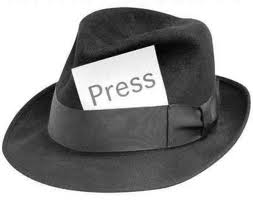News without journalism
 In a Salon.com article, David Sirota makes the case that we are on the verge of having journalism-free news and media industries. What does this mean? Well, here’s an example from the piece:
In a Salon.com article, David Sirota makes the case that we are on the verge of having journalism-free news and media industries. What does this mean? Well, here’s an example from the piece:
“Explaining recent decisions by his news organization to hire people like Ed Schultz, Al Sharpton, Melissa Harris-Perry, Joe Scarborough and others with zero experience in journalism, MSNBC’s Phil Griffin summed up the new zeitgeist in a quote that could be the epitaph on journalism’s tombstone (emphasis added):
‘I’m sorry, I don’t care about journalists…I want fair-minded, smart people who understand the world and can interpret it…If they’re journalists, great. This notion that you somehow you have to have done something to earn so-called journalists’ credentials? Stop.’ ”
Take a moment or two to read the article and let me know what you think.
Tags: journalism, media








It’s a good time to repeat a favorite quote of mine, by Time magazine writer Richard Zoglin – way back in 1996:
“What has exploded is not news, but talk about the news; commentary, not information. … It’s cocktail party chat passing for journalism.”
I agree with Peter and would like to ad the problems have been a long time coming.
First, let’s be honest. Investigative reporting is expensive.
Two, fair and balanced turns into two sides to every story and a whole lot of he said and she said without any attempt to pick a side.
For newspapers and others, there is far too much reliance on the AP. Nothing wrong with the AP but…
Let’s not forget how selective the “news” can be.
We all know “blood leads” and the history of “yellow journalism” has a long if not glorious history.
Confronted with the “instant news” of TV and the Internet, “serious journalism” finds itself in competitive waters it knows not how to deal with. Like it or not, there is and always has been “the bottom line.”
I won’t dare propose any solutions except to suggest dumping the word “journalism” and going back to the much simpler word of “reporting.”
Zoglin’s quote, dated and simplistic, is as good a place as any to start the discussion. For one thing it sets up a false duality of Stop-the-presses! reporting (associated almost exclusively with newspapers)(Yay newspapers!) and That’s-an-ugly-necktie! commentary (associated by default with blogs)(Boo blogs!). Pick up any newspaper nowadays and you will see plenty of commentary—The Adirondack Daily Enterprise prints excerpts from the In Box—visit any blog and you will see news—Adirondack Almanack comes to mind.
What the quote (and the salon article) ignores is the mass of connective tissue between raw news and opinion that is analysis: the process of placing the news and opinion into proper context. Analysis is a hybrid. Reporters use it to give otherwise unimportant facts significance, editorialists and commentators use it to back up their otherwise speculative arguments.
As more and more newspapers layoff reporters, photographers, copy editors, etc, the distinction between newspapers and blogs, pro journalists and amateurs, stretches toward the vanishing point.
Mark, I mostly agree with you, and I wasn’t saying, “News=good, commentary=bad.” To me, the emphasis of that quote is on the first three words, “What has exploded.” It’s all about where you put your resources: informing or commenting.
What we have much more of – in blogs but also in newspapers, magazines, broadcast media and various not-so-bloggy Internet media – is, yes, commentary, but I would also add “targeted reporting.” For instance, Mark, your reporting on the Post-Star-Lee layoffs/executive bonus story was really good, and other media up here probably wouldn’t have dug it up because none of us are following the Lee corporate beat. These days, more unpaid reporters (I don’t think “amateur” is the best term) are covering whatever interests them – beats traditional media neglect. It’s part of the “long tail of the Internet” thing.
Meanwhile, as traditional, place-based media like newspapers reduce their reporting staffs, it makes me wonder whether we have fewer beat reporters covering whatever happens on those beats, whether it interests them in particular or not.
By the way, Mark, regarding your closing comment, “the distinction between newspapers and blogs, pro journalists and amateurs, stretches toward the vanishing point”: Even if you don’t think there’s a difference in quality of work, there’s a huge difference in quantity. A paid beat reporter generally writes at least one story a day and sometimes many more than that. A paid reporter spends roughly 40 hours a week looking for news and reporting it. Even if the unpaid reporter doesn’t need the paycheck and has that much time to devote, will he or her? If so, by all means, but we can’t expect it, and I doubt it’s the way of the future.
There’s also the question of editing. Paid reporters generally have paid editors who help improve their work, checking for mistakes and weaknesses and suggesting improvements. An unpaid reporter has him- or herself plus whichever family members or friends (s)he can rope into giving it a read. That matters.
The distinction between blogs and newspapers will vanish when they have equal reporting and editing resources. Yes, that gap has narrowed, but it’s still pretty gaping.
Pete,
Just kidding but if you are going to use he, it should be followed by she – not her.
Yes, we do need our editors, me included.